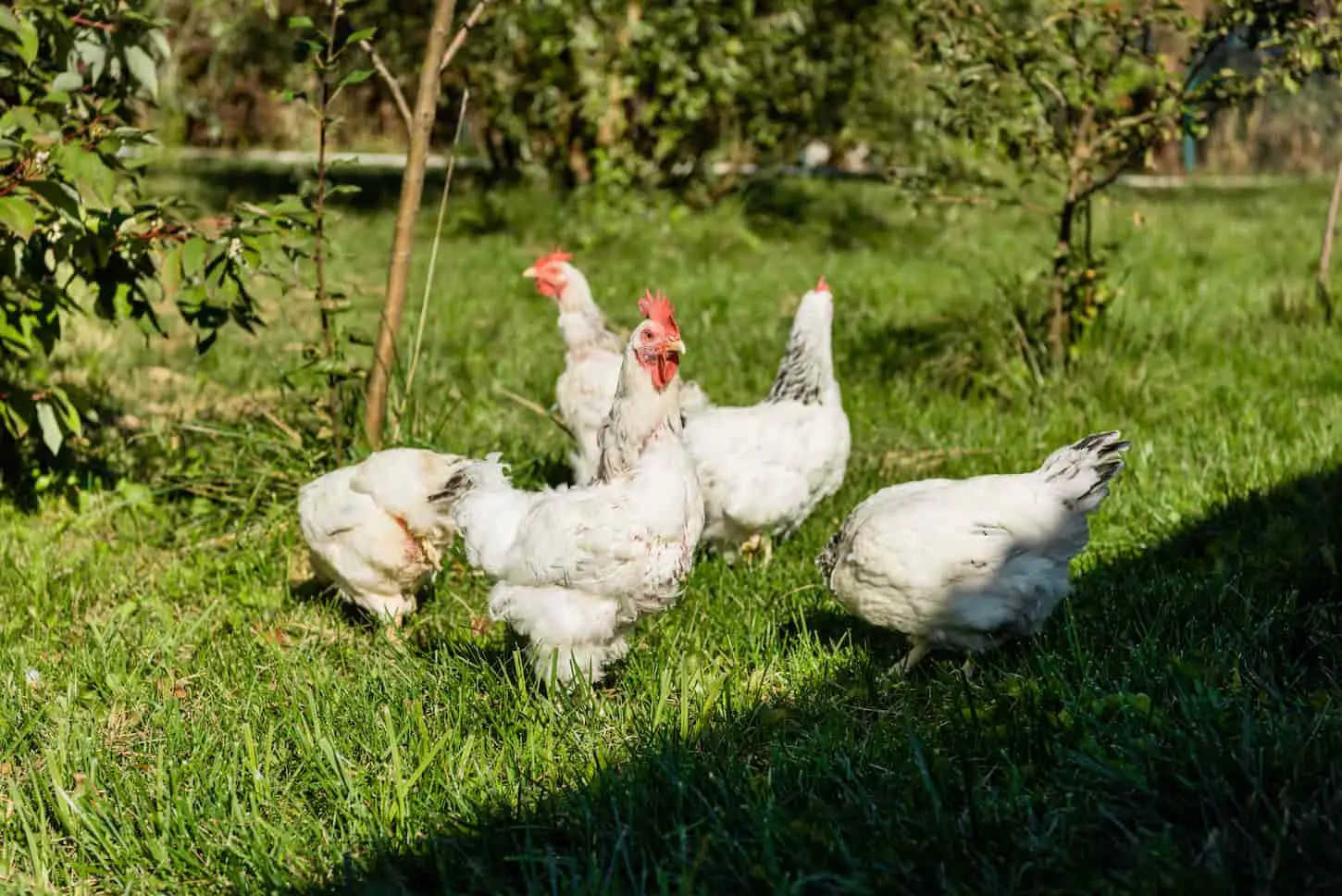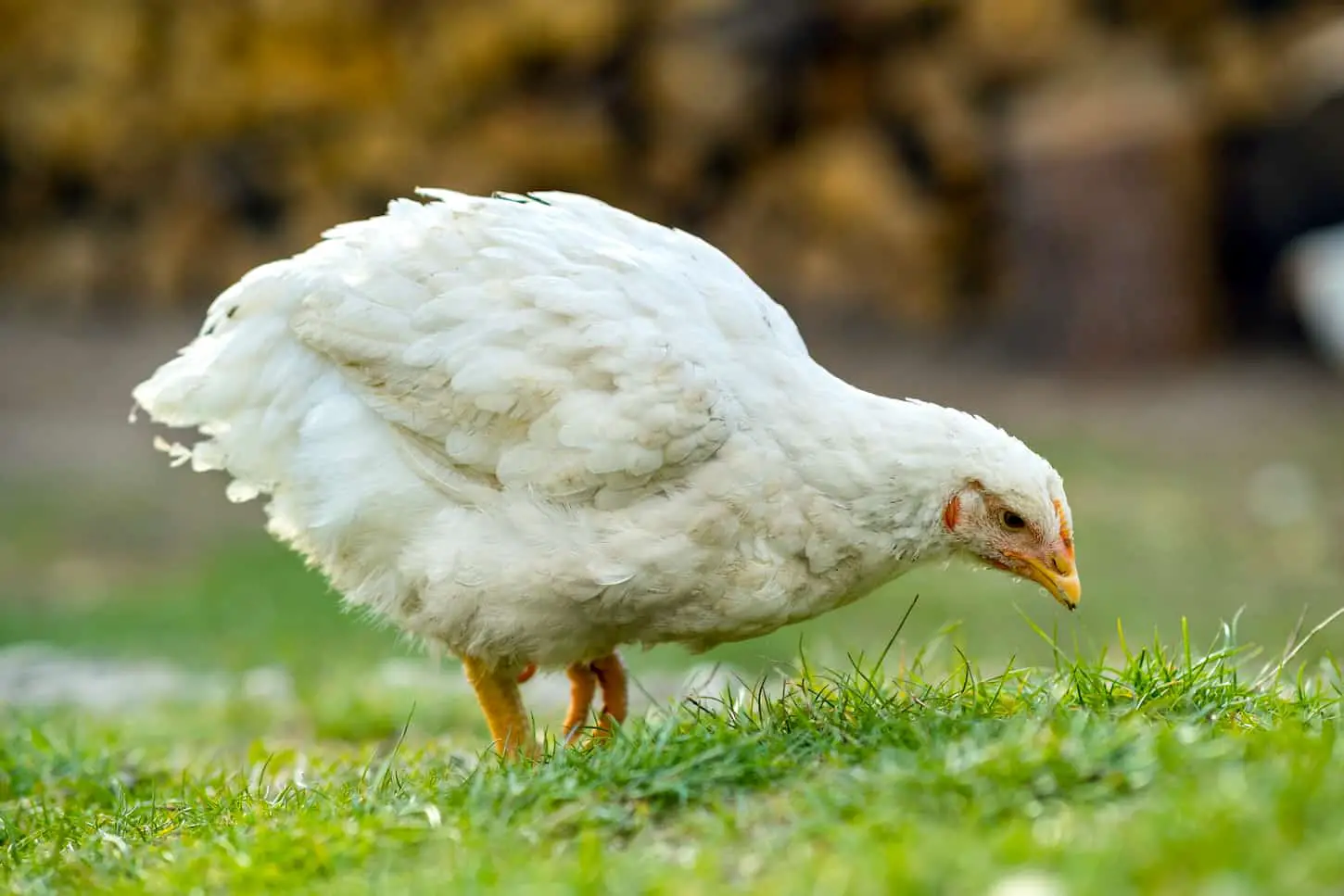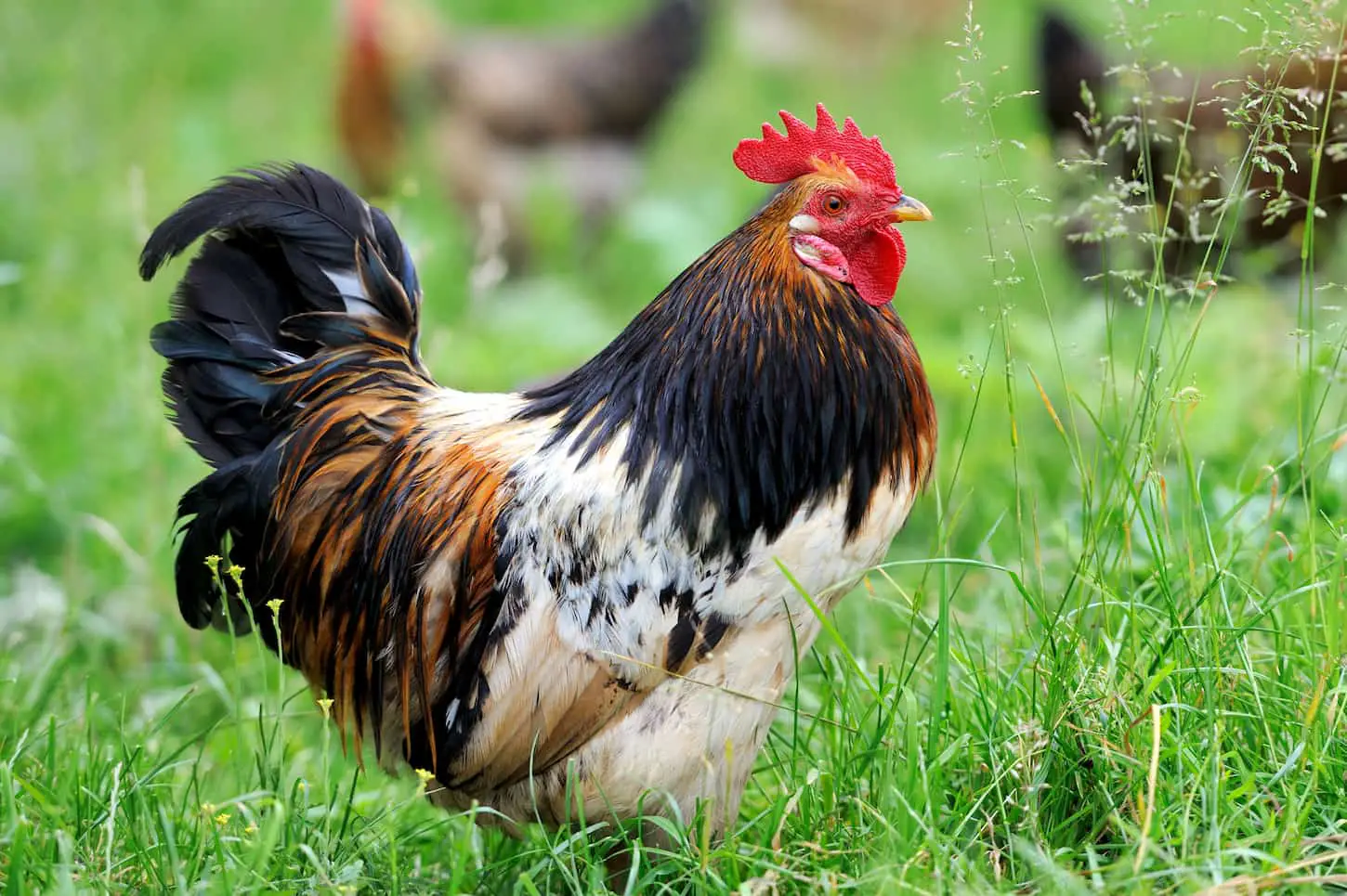Meal planning and grocery shopping don’t usually make me think about gender equality issues in chickens, but recently I got asked a thought-provoking question that did just that. It was this: why are we only eating female chickens.
Both male and female chickens are raised for their meat. There is a measurable difference in total protein and meat texture between mature roosters and hens. However, most meat chickens are slaughtered before maturity to create a more uniform and tender selection of meat.
Ready to read more about meat chickens – and why we eat both male and female chickens? Keep reading – and then we’ll all get a hankering for our favorite chicken-based dish. BBQ chicken sounds great to me!

Both Hens and Roosters are Raised for Meat
Meat chickens aren’t generally limited to a single chicken’s sex, unlike egg layers (only female chickens lay eggs). This is for several reasons.
- Meat chickens are most usually slaughtered and processed before full maturity to maximize meat tenderness and minimize any noticeable differences between the cuts of meat.
- It’s hard to be certain of a chicken’s sex before full maturity.
- Why would a meat production company (or an individual) limit themselves to only half of a population – when the full population is a viable and usable option?
Before we go into each of these, I’d like to mention that there is a single exception to these general rules. And it’s if you’re raising your own meat chickens – and if your zoning codes or local laws prohibit you from owning a fully-grown rooster. But we’ll go into this exception later on in this section of the article. For now, we’ll dive into each of the three main reasons why sex doesn’t have much effect on meat.
Animals who are specifically raised and slaughtered as meat are usually culled before they’re too old. This is because younger animals make for a more tender and delicious meal. Older animals who make it to the dinner table are usually tougher meat – unless they’re made into a stew and cooked into a forced tenderness.
While we haven’t raised meat-only chickens, we’ve raised dual-purpose chickens. Americauna chickens are great for laying eggs (and they’re such fun colors) but can also be meat chickens. Here’s why that’s important: we couldn’t be certain that our Americaunas (and the other breeds) were female, despite being sexed, until they were several months old.
In fact, it was almost more of a “let’s wait until they’re 20 weeks old and are laying to be sure that they’re female, although if they start crowing that’s generally a good sign that they’re male” kind of a scenario. More experienced chicken owners can tell a difference in feathering patterns before that point, but to a new chicken owner (or a regular person who’s never owned chickens before), it’s really hard to tell the males from the females until they’re fully grown.
But don’t let that make you feel bad. Even the experts don’t get it right all of the time. Chicks that have been sexed are more likely to be female – but even then, it’s only about 90% accurate. So if a chicken meat production plant were relying on only female chickens to process into meat, there’d still be a 10% chance that they got a rooster if they relied on sexed chicks. And even then, they’d have to wait until the chickens were old enough to truly determine their sex.


So why would a meat farm or producer limit themselves to only female chickens to process as meat? Well, they don’t. Because of the way that they raise, feed, and process the meat, there’s not much difference between the finished product – and that’s fully intentional. That way, they’ve got more products that can be raised, processed, and sold.
On the other hand, if you’re going to raise your own meat chickens, then you’ll need to decide if you’d like to only keep one sex – or if you’re okay raising both yourself. You’ll need to consider your local laws, codes, and zoning requirements in your decision-making process.
Many backyard homesteaders, for example, can’t have roosters (or are choosing to skip roosters). So in that kind of scenario, they only raise female meat chickens on purpose.
However, most zoning laws may make an exception for a chicken of as-yet-undetermined sex. For example, in our previous neighborhood, we couldn’t keep fully-matured roosters. However, we could keep young, male chickens until they matured. So if we’d wanted to raise chickens for meat, then we could. We’d just have needed to slaughter them before they were fully matured.
In any case, no matter where you live, please know and follow your local laws and zoning codes for livestock or poultry.
Larger-area homesteaders or farms, however, usually have more leeway in being allowed to keep roosters. So in that scenario, you may want to keep a few roosters for continued breeding – and then slaughter the rest for meat as needed.
Where we live now, we have far more options. However, at this time we choose to skip roosters in an effort to foster better relations with our neighbors. Somebody else in the neighborhood keeps roosters, though, so maybe we’ll reconsider at some point in the future.
Why Don’t Humans Eat Male Chickens?
People eat male chickens (roosters) on a regular basis. If you’re buying your chicken from the store, odds are that half of the chicken you get is from a young rooster. The other half is from young hens.
However, because the commercially-raised chickens are slaughtered before they reach full maturity (but when they’re at their best size), they aren’t mature roosters. They’re male meat birds, destined for your table.
If you’re choosing to raise your own meat birds, then you may be pickier about only raising meat hens or roosters. That’s going to be your call. I know of some homesteaders who only raise female meat birds because they think it causes fewer issues without a rooster (even a not-fully-mature one) around.
From my experience in forums and in researching this, though, it seems like most folks who raise their own meat birds don’t keep track of what sex the chicken is – it’s a meat bird and it’s destined for tummies. From there, it seems a more even split as to who keeps birds for breeding their own meat birds versus who will buy meat birds as chicks to raise.
Again, those who raise their own meat birds typically slaughter their meat birds before they’re too old. This is because older birds have tougher meats. You could still slaughter an older bird (this happens to roosters on a regular basis – especially if they get too cranky or controlling), but it will mean tougher meat.
Most folks who cull an older (but safe-to-eat) bird use the tougher meat in a stew. That way, the meat has plenty of time to soften so it’s still a delicious meal. This is especially true for roosters.
Are Male Chickens Suitable for Meat?
Male chickens are definitely suitable for eating! Depending on their age, you’ll want to adjust how you prepare the meat for consumption. Male chickens usually have meatier breasts, so they’re a popular option for those who prefer chicken breasts to other cuts of chicken.
If the male chicken was slaughtered before it reached full maturity, then the meat will be tender enough that you can prepare it however you’d like to.
However, if you’re culling your own rooster and he was sexually mature, then you may want to use that meat in a soup or stew. You can still use it for whatever you want, but expect to chew more if you don’t tenderize it.
Related Questions
Is it Smelly to Keep Chickens? Keeping and raising chickens should not have any bad smells associated with the coop, run, or chickens. Bad smells indicate problems with the overall systems used. For more information on raising chickens in a smell-free environment, read my article on why and how keeping chickens shouldn’t offend your nose.
Can You Keep Chickens with Other Animals? Chickens can share a pasture with many other animals as long as each species has its own home. Here are my articles on keeping chickens with goats and another on keeping your flock with alpacas.
How Long Do Chickens Live? Chickens can live as long as 20 years, although 5-8 years is a more common life expectancy for chickens. Make sure you read my article on 5 factors that will affect your chicken’s expected life span.
